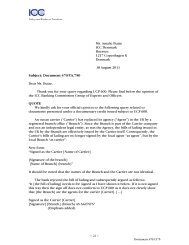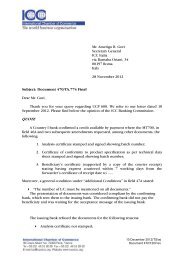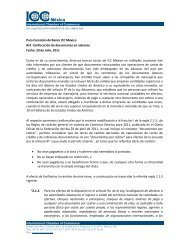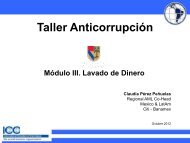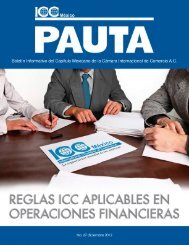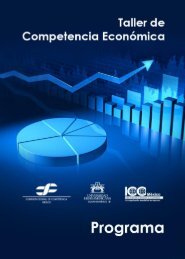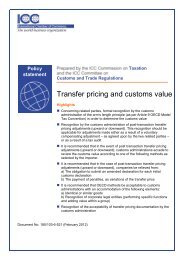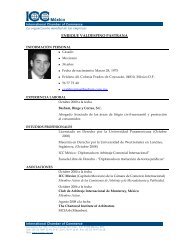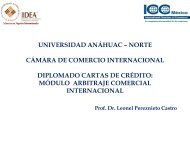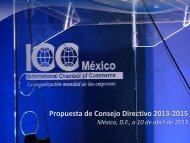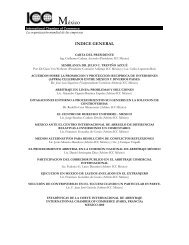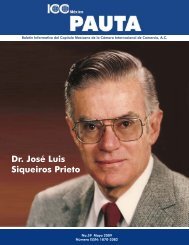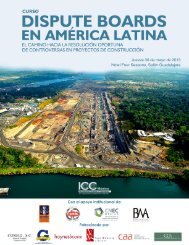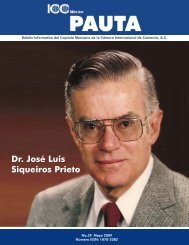Pauta 54.pdf - ICC México
Pauta 54.pdf - ICC México
Pauta 54.pdf - ICC México
- No tags were found...
Create successful ePaper yourself
Turn your PDF publications into a flip-book with our unique Google optimized e-Paper software.
Final Report on ConstructionIndustry Arbittrations18. In cases of complexity it will be sensible to hold at least one further procedural meeting at which the timetable willbe reviewed and difficulties discussed and the list of issues reconsidered. [Paras 33, 47]19. In cases where there have already been prior discussions serious consideration should be given to proceedingdirectly to proof by requiring the parties to present submissions accompanied by the evidence that each considersnecessary to establish its case (in the light of what is then known about the opposing case), both documentaryand in the form of attested statements from witnesses. Unless the arbitration is “fast-track” these submissionsshould not be submitted simultaneously but consecutively, with the claimant presenting its case first so thatdefendant can reply to it. The timetable will therefore need to be fixed by the tribunal. The tribunal may thenpermit the parties to submit further submissions or evidence either of their volition or to meet requests ordirections of the tribunal. Once this stage is complete the tribunal will be better able to draw up a list of the issuesas they appear to it and to guide the parties as to what is now required. [Paras 34 and 35]Further Working Documents and Schedules20. Some specialists favour the creation of a working document by exchange between the parties which records quitebriefly the essential elements of each party's case. These “schedules” are best used for typical claims for changes,for disputes about the value of work and for claims for work done improperly or not at all. Such schedules can becreated and can travel on disk or via e-mail so they need not be cumbersome to handle. If fully and properlycompleted, schedules identify points that are not in dispute or which are irrelevant and thus expose the points thathave to be decided. Schedules may also be used to extract the parties' cases on claims for delay (prolongation)and disruption but they require special care to be effective. Such schedule is of particular value where the claim is“global”. [Paras 37-39]21. Even if a schedule is not used at this stage it may be useful for one to be prepared (by the parties or the tribunal,or both) after the first submission of evidence or before the hearing takes place so as to find out what then needsinvestigation and decision. [Para 39]Tests22. Where the complaint is about the unsuitability or mal-functioning of plant, equipment or work, the tribunal willneed to ascertain what tests have already been carried out and whether the results are agreed or sufficient for thepurposes of the arbitration. [Para 40]23. The tribunal should sanction tests that have not already been carried out (but it must be sure of the time neededfor them). Although in the majority of cases a tribunal will seek to persuade a party of the value of a test any testrequired by it must be non-destructive if made without the consent of the party whose property is affected. Thetribunal cannot and should not order any other tests of its own volition. Tests which the tribunal considersnecessary and which are not permitted by the party that owns the property will have to be conducted by or for thetribunal elsewhere (if still practicable and likely to be of real value even if carried out off site), either as part of thetribunal's obligation to ascertain the facts (Article 20.1) or by an expert appointed by it pursuant to Article 20.4.These recommendations apply whether the tests are carried out by an expert appointed by the tribunal or by aparty (although once the arbitration has started any test carried out by an independent expert appointed by aparty should be carried out jointly with any other expert and under the direction of the tribunal). Similarconstraints apply to inspections of the site. [Para 40]Visits24. It can be very helpful to combine joint tests of plant with a visit by the tribunal, provided that there have been nomaterial alterations since completion and the operating conditions are representative of those contemplated whenthe contract was made. [Para 41]PAUTA 58



